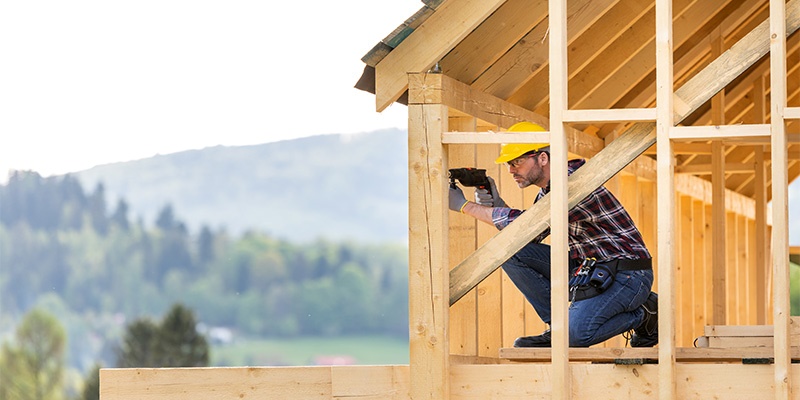When Will Building Material Prices Go Down?

A lot has happened over the last few years. From a global pandemic to the cost-of-living crisis, all of which has had a dire effect on our economy. The building industry in particular has seen its struggles, with delays and price hikes plaguing supply chains all over the world. Many businesses have fought to stay afloat, as have a number of tradespeople and construction companies. It’s all been a bit ‘doom and gloom’ with many looking for a sign that the worst is behind us.
There of course is good news and bad news, and we’re going to look at what this all means for the construction industry in 2023 and beyond. While we’ll be looking at an array of factors and topics, keep in mind that we believe it is just as important as the last couple of years to retain tight control on material costs no matter the project you’re carrying out.
Why are Building Costs Expensive?
As you’re probably aware, the economic situation in the UK is unsteady. The majority of the current problems started with the Covid-19 Pandemic but peaked in severity during 2020 and 2021. With entire industries coming to a standstill, production rates plummeted. Exports and imports are still recovering across the world.
The pandemic caused a number of other problems, and together with the tensions and conflict on mainland Europe contributed to the cost-of-living crisis, where the prices of necessities have skyrocketed. This means many have less of a disposable income – if any at all – and as such are saving their money for only the most important of construction tasks. Not only this, but they are also attempting projects themselves instead of consulting professional tradespeople in an effort to slash bills.
There is still demand for building up and down the country, but with imports having risen dramatically, the rise in material costs has driven up the overall prices. There is therefore an unfulfilled need for affordable housing that local governments are struggling to meet, and many construction groups are unable to provide.
Are Building Costs Going to Rise?

There is a lot of debate surrounding this question, and so at the moment, the answer remains unknown. However, experts are confident that the rates won’t rise as sharply as they have done over the last 12 months, which may come as a relief to some homeowners as well as tradespeople.
However, that doesn’t necessarily mean the situation is going to improve soon. There are still a number of issues with the economy that haven’t been resolved, the continuing cost-of-living crisis chief among them.
One of the more positive notes is that there doesn’t seem to be any surefire sign that prices are due to rise anytime soon. However, it is best to assume that – at best – they are plateauing.
Are Building Costs Going to Fall?
At some point, it is likely building costs will fall, but confidently saying when is an impossible task. As mentioned above, various problems are still plaguing the economy, with no real end to several of them in sight. However, once they have been resolved, you can expect the economic landscape to settle, and building material costs to calm in turn.
However, don’t expect the prices to return to their former low levels. Inflation has always increased prices for centuries. However, what usually happens is that wages have risen in turn as well as spending, keeping the economy relatively balanced and items affordable. Once the landscape has calmed, it will have been a few years since these large and disruptive events started, so prices will have risen. Even if these events hadn’t occurred, you would have seen prices rise over the years – though not anywhere near as severely.
So, keep in mind that prices aren’t due to fall so much as settle down, but there is still no clear sign as to when this is going to happen.
When Will the Situation Improve?
Again, this is unknown. There isn’t a clear sign as to when things will get more affordable, but work is being done to change this with governments and certain corporations working to improve the economic outlook. However, the fact of the matter is that every developed country is currently experiencing considerable hardship and will likely do so for the foreseeable future while economies adjust to the dramatically changing global landscape.
Most MPs and financial experts believe that we’ve seen the worst of the situation, with similar potential risks such as the American Debt Ceiling Crisis currently on track to be avoided. We will have numerous hardships spring up in the near and far future, but we will hopefully be better prepared for them than the sudden and devasting events such as the pandemic.
What Can I Do to Avoid High Building Costs?
The most important thing you need to do to avoid high building costs is to budget according to the latest online prices. Many articles – even recent ones – have aged poorly in the face of the changing political and economic landscape.
This is why this article has so far avoided specific figures regarding current prices, as things could change drastically once again within the next few months. Sticking to articles and reports that are – at most – a month or two old will help you to get a better idea of the current situation.
Beyond that, avoiding unnecessary projects is your best bet when it comes to saving money. Taking advantage of sales and promotions will also allow you to avoid a larger final bill. Consulting experts for advice may also provide you with more insight into current trends and prices and keeping up with news stories from reliable sources will allow you to get a better idea of what exactly is going on in the world, and how this will affect the cost of building materials.
Should I Avoid Hiring Professionals?

This is a question that gets asked a lot, as labour costs make up a large percentage of home improvement bills, along with the cost of the materials themselves. As prices have risen, so too have labour costs, though it should be noted that some groups have increased their prices more than others, and a very small percentage are looking to take advantage of unreliable rates to charge more than necessary.
The best way to avoid these less reputable tradespeople is to opt for individuals and organisations with a large number of positive reviews. Word of mouth is even more reliable than online ratings, so ask friends, family, and neighbours if they can recommend anyone local to you in order to be sure of a dedicated and reliable tradesperson – of which there are many.
However, the most important thing you should remember is that it is extremely unwise to try and tackle a project yourself if you’re not sure how. The cost to repair a mistake can be just as much s the original job. If you can’t afford a professional and the job isn’t urgent, then it may be best to avoid carrying out the task until either prices come down or you have saved up additional funds.
Unfortunately, the conclusion to this guide isn’t particularly concrete – as of writing, prices of building materials aren’t due to surge, but at the same time there isn’t an incoming drop in sight. What can be expected is less turbulence over the course of the rest of this year and the next, especially on the scale of 2021/22. However, it is uncertain whether or not things will improve after 2024.
The largest continuing factors are the recovery of industries after the pandemic and the ongoing conflict in Ukraine, both of which continue to have severe knock-on effects on economies across most of the world. Until these situations are stabilised, things will continue to look uncertain.